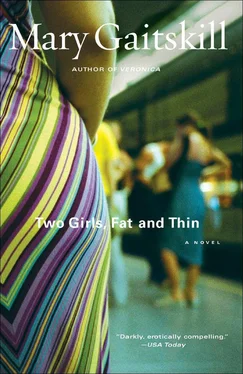Mary Gaitskill - Two Girls, Fat and Thin
Здесь есть возможность читать онлайн «Mary Gaitskill - Two Girls, Fat and Thin» весь текст электронной книги совершенно бесплатно (целиком полную версию без сокращений). В некоторых случаях можно слушать аудио, скачать через торрент в формате fb2 и присутствует краткое содержание. Год выпуска: 2012, Издательство: Simon & Schuster, Жанр: Современная проза, на английском языке. Описание произведения, (предисловие) а так же отзывы посетителей доступны на портале библиотеки ЛибКат.
- Название:Two Girls, Fat and Thin
- Автор:
- Издательство:Simon & Schuster
- Жанр:
- Год:2012
- ISBN:нет данных
- Рейтинг книги:5 / 5. Голосов: 1
-
Избранное:Добавить в избранное
- Отзывы:
-
Ваша оценка:
- 100
- 1
- 2
- 3
- 4
- 5
Two Girls, Fat and Thin: краткое содержание, описание и аннотация
Предлагаем к чтению аннотацию, описание, краткое содержание или предисловие (зависит от того, что написал сам автор книги «Two Girls, Fat and Thin»). Если вы не нашли необходимую информацию о книге — напишите в комментариях, мы постараемся отыскать её.
Review) create a haunting and unforgettable journey into the dark side of contemporary life and the deepest recesses of the soul.
Two Girls, Fat and Thin — читать онлайн бесплатно полную книгу (весь текст) целиком
Ниже представлен текст книги, разбитый по страницам. Система сохранения места последней прочитанной страницы, позволяет с удобством читать онлайн бесплатно книгу «Two Girls, Fat and Thin», без необходимости каждый раз заново искать на чём Вы остановились. Поставьте закладку, и сможете в любой момент перейти на страницу, на которой закончили чтение.
Интервал:
Закладка:
But this didn’t happen often as her mother usually accompanied her father to work. Sometimes her mother left the office early so that she could be home when Justine arrived from school. Other times her mother stayed late, and Justine came home to Gemma, the housekeeper. Justine would then call her mother at work and ask when she was coming home. “Soon darling. Can’t you go play with Richie?”
“I don’t want to play with Richie.”
“Well then do your multiplication tables with Gemma.”
“I already did,” she’d lie.
“Sweetheart, I cannot stay on the phone. I am a receptionist. Keep busy and I’ll be home in an hour or so.”
“But Mama, I want to tell you what Miss Grub said today.”
“Were you good in school today?”
“Yes, but—”
“The phones are lighting up, darling, I have to go.”
Sometimes she would only be on the phone for bare seconds before her mother’s voice would swell with threat and rejection. Other times she could stay on the phone for a long necklace of lovely minutes, shifting her weight from hip to hip, relishing her mother’s words. It was hard to say what made her mother respond differently.
When she hung up, she’d go to her room and change her clothes, feeling like a survivor in a spaceship after a meteor storm. Then she’d drag through the house looking for something to poke into or violate. Without her mother there, her vigorous energy connecting every object with a bright ribbon of purpose and sense, the stark utilitarian furniture seemed alien, ugly, almost frightening. This was especially true in contrast with her hours in school, sitting in rows of desks, each desk and its inhabitant a world with its own system of tasks and exercises. Justine regarded other children as spacecraft one could signal to, either peacefully or in war, and school, with its organized hours and lunch period, facilitated this impression. She wandered the apartment, wanting to smash a vase or carve something on a table. She was so lonely.
She would try to think of other things, or tell herself a story to keep from calling her mother again, and sometimes it worked. Other times she held off making the call, as she’d sometimes hold off going to pee — the mounting pressure, so uncomfortable it made her squirm, doubled the voluptuous pleasure of letting go, or of rushing to the phone to obtain the loved voice, no matter how scolding.
“Justine, really, you cannot do this to me. I told you, I will be home. The more you call, the more you delay me.”
She sounded angry, but Justine had once heard her talking on the phone to Mrs. MacCauley about how Justine called her at work, and she’d said, “Yes, but it does make one feel good to know one is wanted.” Thus, although her mother would speak angrily, and Justine would apologize and whine, she knew they were simply having two conversations: the one on top in words and the one underneath, which was conducted in tones of voice, silences, and breaths. Still, it was humiliating to have to make these calls.
Sometimes she would go sit in the kitchen with Gemma, who would be moving around the stove making dinner or sitting at the table, reading a paperback and smoking a cigarette while a pot of food simmered. Gemma was a young black woman with luminous purple-hued skin, a straight slim back, and serious, silent eyes. She would talk to Justine and occasionally play cards with her, but she always held Justine away from her, somehow using the very words of their conversations as a fence to emphasize the stretch of territory between them. Justine often felt that Gemma did not like her, and further, that her dislike had nothing to do with who Justine actually was. Sometimes this made her want to charm Gemma, to make her like her. Sometimes it made her want to hurt Gemma. She couldn’t get near enough to do either.
One night when her mother had come to say goodnight to her, she said, “I don’t think Gemma likes me.”
“Why do you think this?” Justine could hear an unfamiliar element in her mother’s voice. “Has she been unkind to you?”
“No. I just don’t think she likes me.”
“Nonsense dear, I’m sure she likes you.” Her mother patted her vigorously for a second, and then the movement of her hand slowed and strayed over her leg, as though uncertain and considering. Then she took it off Justine altogether and put it in her lap. “I am going to tell you something very adult.” She paused again and Justine nodded. “Negroes are not in a good position in our society because at one time they were slaves. A lot of white people believe that they are inferior because they are dark-skinned and do things to hurt Negroes. They keep them out of restaurants and jobs and sometimes hurt them and kill them. We do not think this way. We believe all people are equal. But because of these prejudiced white people, many Negroes do not like any white people. You cannot do anything about this. You must respect Gemma and be extra kind to her, but you cannot have a normal relationship with her because of this. The lives of white and Negro people are very separate. But there must be politeness and decency between them. Do you understand?”
Justine nodded, unhappily regarding this bloodless world of decency and politeness that had just opened before her.
“But if Gemma is ever rude to you, you must speak to me immediately.”
Justine nodded again; she could no more imagine silent, gliding Gemma being rude than she could picture Miss Grub, her teacher, taking her clothes off in class.
“And you must never, ever repeat any of this conversation to Gemma. Do you understand?”
Justine thought of Gemma’s dark, veiled glance, which was piercing and indirect at once. It made her puzzled and sad that they could only have politeness and decency between them.
After this conversation, she watched Gemma and her mother together with interest. Her mother would usually come home as Gemma was getting ready to leave. She’d sweep into the kitchen with Justine at her heels and say, “Hello, Gemma, how are you?” and then look all around the kitchen, seeing what Gemma had done and what she had cooked for dinner. She might say, “Gemma, do you think you could bag the garbage a little more securely?” or “Would you have time to mop the floor tomorrow?” or “Gemma, you’ve done a wonderful job, I don’t know what I’d do without you.” And sometimes they would stand at the back door talking about an advance in pay that Gemma needed or a possible day off. Justine would look admiringly at the two tall women, especially her mother, who could tell another person what to do and have her do it.
But sometimes it worried her to see the two of them together, Gemma speaking from behind the shield of her cold dignity, her mother from the height of her impenetrable politeness. She wasn’t sure that Gemma knew that her mother wasn’t one of those white people who hated Negroes. How could she know for sure when her mother told her to bag garbage and mop floors? Justine wanted to tell Gemma that her mother liked her and that she did too.
Then other times it would seem to her, from the way Gemma nodded and answered her mother, that Gemma understood this perfectly, that the talk the two women had in the kitchen was a code for some other kind of conversation, like when Justine called her mother and her mother pretended she didn’t like it.
Into adulthood, she remembered Gemma’s still face, her measured voice, and the words that disappeared in the air between them. Their empty companionship was like a small void in the larger emptiness of the house without her mother.
Her father said that she was lonely after school because she didn’t have enough to do, and it was decided that she should take piano lessons three times a week.
Читать дальшеИнтервал:
Закладка:
Похожие книги на «Two Girls, Fat and Thin»
Представляем Вашему вниманию похожие книги на «Two Girls, Fat and Thin» списком для выбора. Мы отобрали схожую по названию и смыслу литературу в надежде предоставить читателям больше вариантов отыскать новые, интересные, ещё непрочитанные произведения.
Обсуждение, отзывы о книге «Two Girls, Fat and Thin» и просто собственные мнения читателей. Оставьте ваши комментарии, напишите, что Вы думаете о произведении, его смысле или главных героях. Укажите что конкретно понравилось, а что нет, и почему Вы так считаете.












